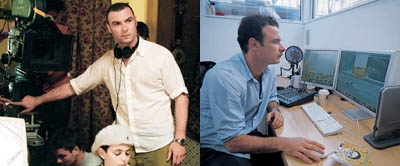Taking iCommand Page 3

Hollywood Comes Home
Liev Schreiber did much of the postproduction work on Everything Is Illuminated on a Mac G5 computer in his home office. Many directors have begun to blur the lines between home and pro moviemaking (see "Barry's Digital Adventure," September, and the interview with Robert Rodriguez in "BackTalk," October - both available on our Web site). So I talked to Schreiber about making a movie with tools that are accessible to almost anyone. - M.G.
How did you learn to edit a feature film at home? Before I started to make the movie, I fooled around on my computer with [Apple's] iMovie, a very basic nonlinear editing program. It's amazing how well that prepared me for both Final Cut Pro and Avid [professional editing software]. When I first played with iMovie, it was immediately obvious what a profound effect programs like it would have on movies. Technology that you needed four years of training to master in the old days, a kid can now learn on his home computer by fiddling around a couple of hours a night for a couple of weeks.
How do you feel about more and more directors doing postproduction work at home? It's really exciting since it opens up film to a lot more people. So many kids are so much more computer savvy than a lot of people who are running the industry. With this software, anybody who wants to can learn how to make a film. And, since it's on your home computer, you can practice until you become good at it. That's why the hip-hop movement was so phenomenal. Kids could practice cutting and scratching and sampling using their own records, and a whole style of music developed out of it. I think we're going to see the same thing with film.
Were there any surprises that came out of editing on your computer? I'm amazed by what I can do with Final Cut Pro. You're not just the editor. You can control the color, so you're the director of photography, and you can create soundtracks, so you're the composer, too. I can sit here and do voiceovers, and since the mike is hooked up online, I can loop other actors as well.
What does this mean for people who make other kinds of films? It used to be if somebody had an idea for a documentary on migrant workers or something like that, they could show their raw footage around to try to get financing, but that was it. Now, in a matter of hours, you can edit your footage and add music and effects so that it seems much more finished. People are more likely to say, "Ooh, I want to be involved in that," and invest.
Is there a downside to that flexibility? The only problem with the technology, ironically, is a creative issue. You have too many choices. In the days of linear editing, when you had to physically cut the film, you had to be committed to a choice because the process was so work intensive. But with nonlinear editing, if something's not right or you're not sure about it, you can start all over again in a matter of minutes.
 What does DVD mean for an independent film like yours? Because independent movies don't have the marketing budgets to get you the big, splashy theatrical release of a Mission: Impossible 3 or whatever, DVD is really, really important. We began to work on the DVD before we finished the final mix of the film because it's so essential to the marketing strategy. I'm especially grateful for it because there's a lot of terrific stuff I want people to see. Every time something great would happen and we weren't quite sure if it would fit in the narrative, the joke was, well, that'll be on the DVD.
What does DVD mean for an independent film like yours? Because independent movies don't have the marketing budgets to get you the big, splashy theatrical release of a Mission: Impossible 3 or whatever, DVD is really, really important. We began to work on the DVD before we finished the final mix of the film because it's so essential to the marketing strategy. I'm especially grateful for it because there's a lot of terrific stuff I want people to see. Every time something great would happen and we weren't quite sure if it would fit in the narrative, the joke was, well, that'll be on the DVD.
- Log in or register to post comments





























































